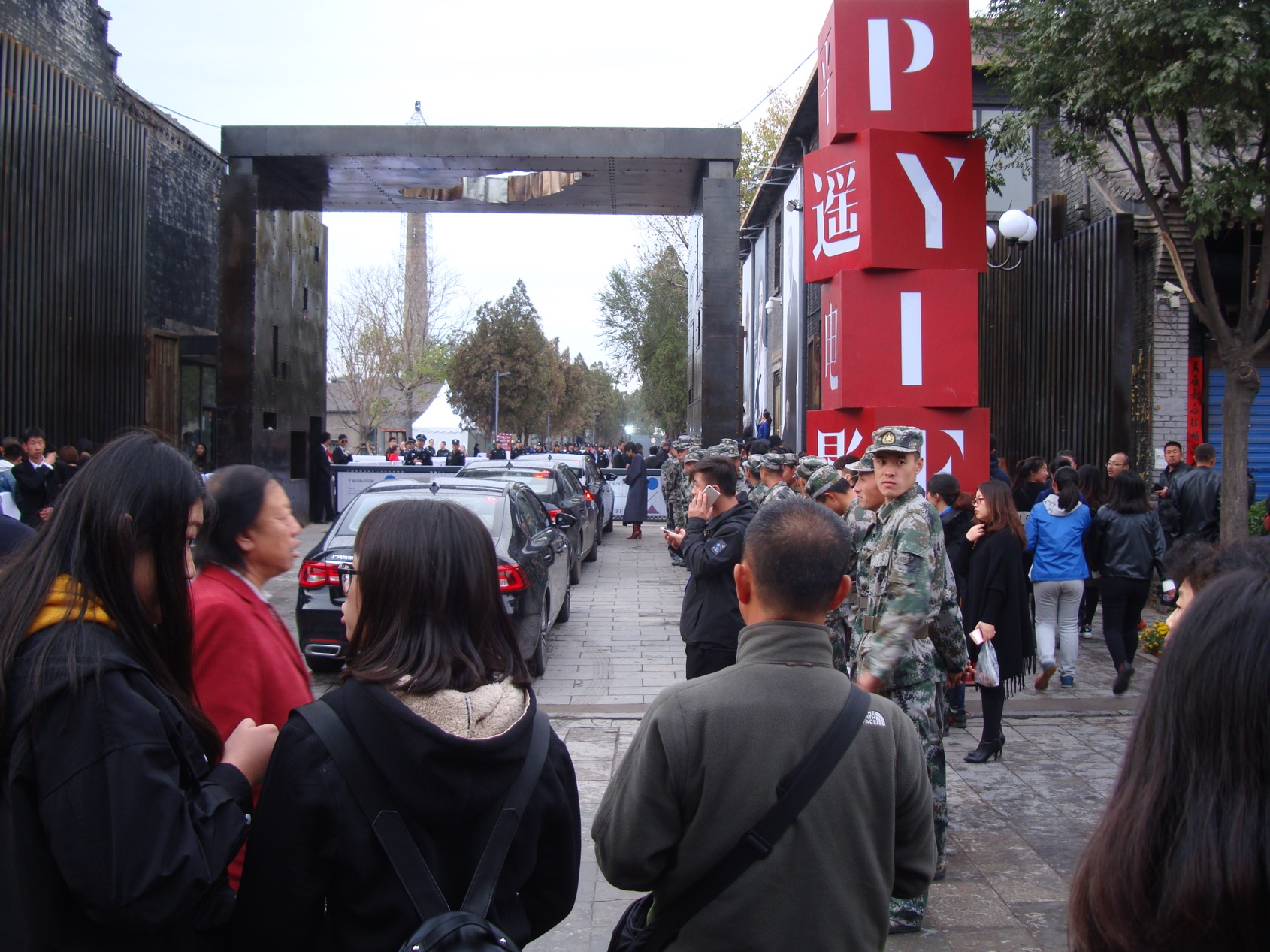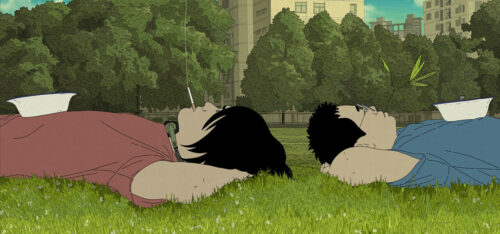‘Sundance of China’ opens with pomp and celebrity, but not much spirit
The Pingyao International Film Festival, organized by acclaimed director Jia Zhangke, opened on Saturday with a red-carpet gala and ceremony featuring A-listers such as festival ambassador Fan Bingbing. Unfortunately, the attraction only ran surface-deep.

PINGYAO — The small Shanxi provincial city of Pingyao 平遥 was built as a defensive buttress, and it has withstood the test of time. It has endured all types of attacks, first from northern nomads, and most recently from proponents of urbanization who wish to tear down city centers in the name of modernization. Now, after 2,700 years of protecting the city, the walls serve a new purpose: attracting tourists as a World Cultural Heritage Site.
There hasn’t been any need for an army in Pingyao for generations. And yet, they came out in full force on Saturday: local police, armed police, soldiers in military fatigues — over 150 men lining the entrance to the Pingyao Film Center.
Welcome to the first annual Pingyao International Film Festival (PYIFF), which kicked off on October 28 and will conclude on November 4.
Only a small crowd of onlookers gathered, creeping forward for a better view inside the dark-tinted windows of passing cars. Nevertheless, the atmosphere was ebullient. Police chatted with the crowd, sharing information on which celebrities would be attending. Soldiers took time, while standing guard, to update their social media feeds. There was excitement in the air, one tempered by the knowledge that much was at stake.
PYIFF adopted the title of Ang Lee’s Crouching Tiger, Hidden Dragon as the central theme for its festival, and used it to contrast up-and-coming movies against established ones — crouching tiger for the up-and-comers, hidden dragon for the establishment. (Never mind that the idiom crouching tiger, hidden dragon [卧虎藏龙 wòhǔcánglóng], with the tiger and dragon together, means “untapped potential/concealed talent.”)
Contrast — ever present in Chinese culture — is also evident in Jia Zhangke 贾樟柯, the acclaimed Chinese director responsible for establishing the Pingyao International Film Festival in his home province. Jia began his career with a number of underground films that won him major accolades abroad but little recognition at home. Even after earning success with mainstream films like A Touch of Sin (2013), it’s PYIFF that provides Jia with his biggest opportunity yet to make an impact in his country, for the festival has been hyped as “China’s Sundance.”
Quibble with the comparison if you’d like, but that’s precisely what PYIFF is going for — or at least what it wants the world to think.
The Sundance Film Festival has established itself as a showcase for lesser-known independent films that would otherwise be passed over for wider distribution. In China, with the success of summer action blockbuster Wolf Warrior 2 still simmering, PYIFF wants to continue shining the spotlight on domestically produced films in a market regularly overshadowed by Hollywood imports.
The festival is led by artistic director Marco Mueller, who previously programmed film festivals in Venice and Rome. Jia also enlisted the help of film elite such as famed Hong Kong director Johnnie To 杜琪峯 and John Woo 吴宇森 (Face/Off, Mission: Impossible 2) to help him realize his dream.
But the most impressive PYIFF ally is Fan Bingbing 范冰冰, China’s top A-list actress, whose red carpet appearances can draw more attention than the movies she appears in.

Fan was the emerald-gown-wearing jewel of Saturday’s gala, and her walk down the red carpet legitimized the fledgling Pingyao International Film Festival in ways that her official role as “festival ambassador” could not. Her presence can’t be understated, much like the large police presence that greeted her arrival. Even festival volunteer Shen Chong, tasked with standing the entire day without rest or pay, was satisfied with his reward of a blurry cell phone photograph of the beauty icon as she exited her car.
“It’s only her side profile,” Shen said demurely, all while failing to mask his pride.
Whereas the stars of films slated for screening later in the festival will get their own red carpet ceremonies throughout the week, Saturday’s red carpet prominently featured non-film-industry celebrities such as singer-songwriter Zhou Bichang (周笔畅, a.k.a. Bibi Zhou) and singer He Jie 何洁, both of whom performed later on.

The festival’s opening ceremony that followed was held in a 1,500-seat theater called Platform, named in honor of Jia’s acclaimed 2000 film that featured a scene shot atop Pingyao’s old city walls.
As appropriate as its naming was, the festival planners did not go as far as to provide the impromptu venue with a roof. The gala audience was subjected to seasonal temperatures that dipped to the low single digits (in Celsius, anyway). Worse, there was a 75-minute delay for reasons untold. The show began so late that organizers bravely decided to forgo the customary speeches made by attending Party officials.
As for the show, it was fully on par with extravaganzas commonly broadcast on Chinese state television. Performances satisfied protocol for culture and tradition, featuring children dancing in unison while carrying a Chinese totem (the lantern, as it were).
But even as singer He Jie performed a perfectly acceptable K-pop dance routine, it was clear that PYIFF isn’t anything like Sundance. Despite Jia’s pedigree, which led the New Yorker to once call him an “archly political auteur,” the festival lacked a discernible spirit of independence.
The Jia Zhangke of today has created a film festival that likely wouldn’t have served the Jia Zhangke of yesteryear.
A roster of some 40 films from 18 countries has been selected, but it remains unclear how much of a role artistic director Mueller played. As reported by China Daily, all PYIFF films are approved “under the guidance of Shanxi and Pingyao’s relevant government departments.”
Whereas Sundance is free to introduce offbeat films featuring unconventional characters and themes to wider audiences, Pingyao is constrained by its mandate to please a higher audience with specific concerns.
Indeed, PYIFF has undertaken some strange decisions made to satisfy somebody somewhere. A month before it was to take place, PYIFF was delayed a week without explanation. Stranger still are the circumstances that led outspoken Chinese auteur Feng Xiaogang’s 冯小刚 Youth to become Pingyao’s opening film. Cleared by state censors and originally set for a wide Chinese release on September 29, Youth was unceremoniously pulled from theaters just a week prior (reportedly due to the 19th Party Congress). After its Pingyao screening, it awaits an unclear fate.
In one of his speeches, Jia spoke of a desire for national unity to enable the flourishing of the arts. But even without his words, this was clear from the festival lineup, with films that adhere to nationalistic sentiment and harmony. Foremost among those was Sky Hunter, which, despite getting saddled with mixed reviews on peer-review site Douban, still managed to sell out quicker than any of its peers, in no small part due to its impressive production and cast. Pitched as “China’s version of Top Gun,” its promotion included children holding up scale models of the Chinese fighter jet featured prominently in the film. Not only that, the movie is directed by red carpet attendee Li Chen 李晨 — a.k.a. Fan Bingbing’s boyfriend — and stars Fan herself.

Smaller-scaled Chinese films on the same program simply can’t compete with Sky Hunter’s huge budget and cast, nor outdo its Wolf Warrior-esque jingoism. If PYIFF continues to cater to celebrity and national principles, there won’t be room for Chinese directors interested in independent filmmaking. As such, the Jia Zhangke of today has created a film festival that likely wouldn’t have served the Jia Zhangke of yesteryear.
But however you appraise it, we have to return to the opening scene. Success for the Pingyao International Film Festival is pretty much guaranteed when troops are called in to guard your front gate. Contrast that with the scenes of independent film festivals throughout China being shut down by police.
Already a popular tourist destination, Pingyao only stands to attract more crowds with its newfound film festival — provided it keeps supplying people with the spectacle they crave. Fan Bingbing’s availability next year remains to be determined.
Also see:






